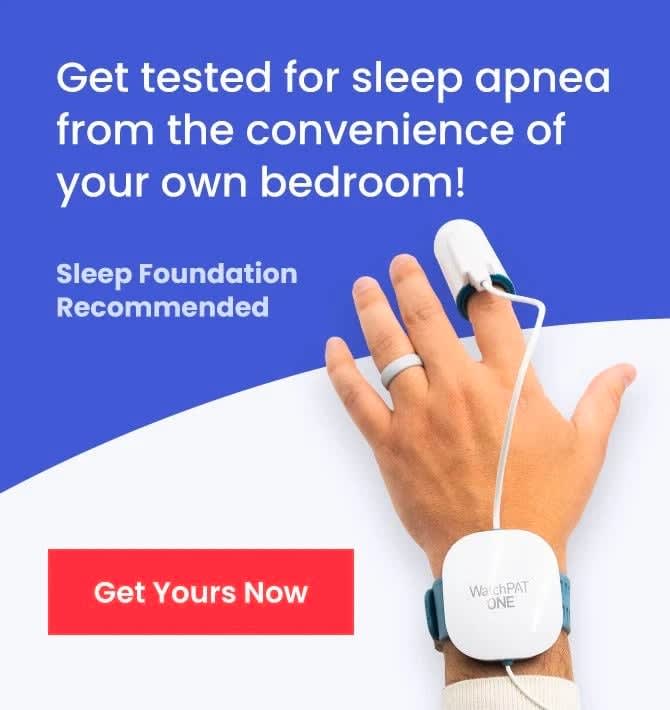When you buy through our links, we may earn a commission. Products or services may be offered by an affiliated entity. Learn more.
Best Nasal CPAP Masks of 2026
Continuous positive airway pressure (CPAP) therapy is a common sleep apnea treatment that works by blowing pressurized air into a person’s upper airway. The air can be delivered through a nasal mask that covers just the nose, or a full-face mask covering both the nose and mouth.
Nasal CPAP masks tend to be more minimalist than full-face masks, and they can be further broken down into regular nasal masks and nasal pillow masks. Standard nasal masks form a seal extending from the bridge of the nose to just above the mouth, though some nasal cradle models sit below the nose and seal against the nostrils. Nasal pillow masks have soft inserts that seal inside the nostrils.
Choosing a mask that fits well can lower your chances of experiencing air leaks or discomfort. We’ll discuss the benefits of a nasal CPAP mask and how to know if it’s right for you. We’ll also explore the differences between nasal and nasal pillow masks, discuss factors to consider when choosing a mask, and share our recommendations for the best nasal CPAP masks. If you’re in the market for a CPAP machine to pair with a mask, check out our team’s picks for the best CPAP machines of 2026.
Our Top Picks
- Best Overall – ResMed AirFit N30 Nasal CPAP Mask
View Details
- Best Value – Rio II Nasal Pillow CPAP Mask
View Details
Swipe for more
Best Overall
ResMed AirFit N30 Nasal CPAP Mask
Use this link for the most current ResMed discount
Use this link for the most current ResMed discount
ResMed’s AirFit N30 is a slim, low-profile nasal CPAP mask with minimal contact points to ensure comfort in the side and back positions. One notable feature is the QuietVent, which reduces noise from the CPAP machine and helps prevent sleep disruptions.
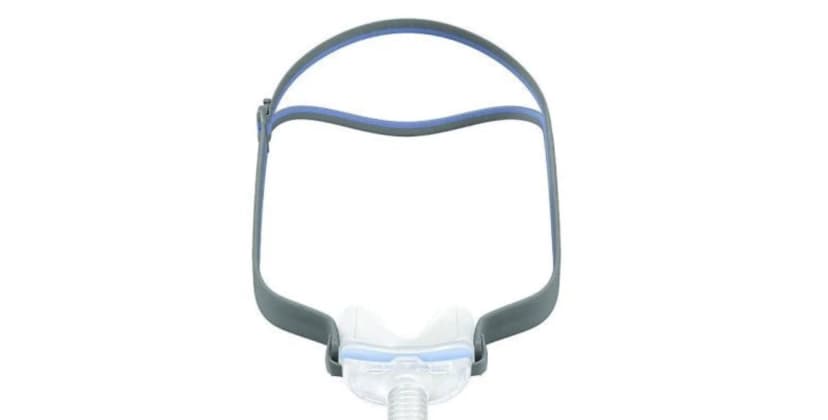
Price
$105
Full Details
If you’re a side sleeper, finding a comfortable CPAP mask can be challenging. The ResMed AirFit N30 is one of the least obtrusive nasal masks on the market today, consisting of slim headgear that runs down the side of your face without blocking your line of sight. The straps are thin enough to rest against your skin without pressing against your cheeks and temples when you lie on your side, and can be adjusted for an optimal fit.
What Does It Do?
The mask’s silicone cushions rest against your nostrils and deliver air directly into your breathing passages without coming into contact with your mouth. You can choose from small, small-wide, and medium cushion sizes. If you aren’t sure which size is ideal for your facial structure, you can order a starter pack with all three cushions — click the link on the mask’s Sleep Doctor product page to learn more.
QuietVent technology is engineered to muffle noise from your CPAP machine and help you and your partner sleep soundly. Since the mask consists of three components, it’s relatively easy to put on, adjust, and remove.
Who It’s Best for
Side sleepers are both ideal candidates for the AirFit N30, as are people who struggle to stay asleep due to loud noise from their CPAP machine. We also recommend the mask for anyone who prefers a lightweight mask that won’t obstruct their vision or come into contact with much of their face. The AirFit N30 Starter Pack is worth considering if you don’t know your most comfortable cushion size.
The ResMed AirFit N30 Nasal CPAP Mask carries a below-average sticker price and standard shipping is free for shoppers in the contiguous U.S. Sleep Doctor allows you to return the mask new and unopened within 60 days of the delivery date.
Best for Side Sleepers
Philips Respironics DreamWear Nasal CPAP Mask
Use this link for the most current Philips Respironics discount
Use this link for the most current Philips Respironics discount
The Philips Respironics DreamWear Nasal CPAP Mask is designed with various sleep positions in mind. The low profile helps ensure a strong fit even if you sleep on your side or back.
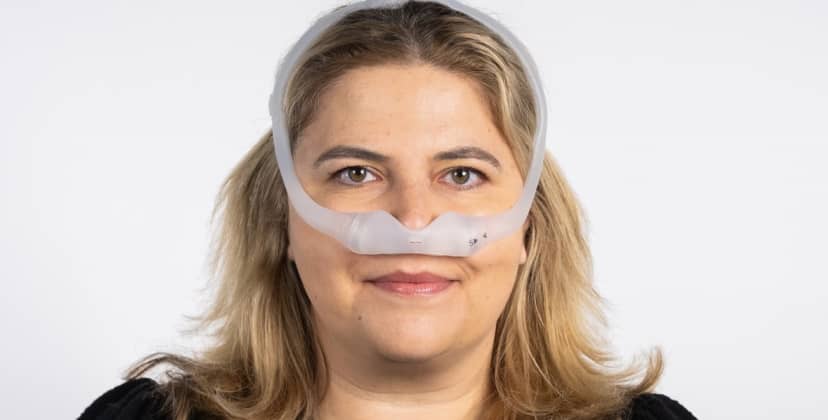
Credit: Sleep Foundation Test Lab
Price
$110
Full Details
Finding a well-fitted CPAP nasal mask can be challenging if you sleep on your side, but the Philips Respironics DreamWear Nasal CPAP Mask can accommodate side sleepers and even stomach sleepers.
What Does It Do?
Like many other low-profile nasal masks, the DreamWear’s tube connections are at the top of the user’s head. The mask has a swiveling connector, allowing users to move comfortably without worrying about dislodging the tube. The headgear is made of soft silicone designed for minimal irritation or face marks, and the DreamWear Nasal Mask comes with fabric wraps for additional comfort. Due to its simple silicone design, the mask is easy to clean.
Who It’s Best for
The Philips Respironics DreamWear Nasal CPAP Mask’s flexible silicone cushion sits beneath the nose and against the philtrum, while simple, stable headgear allows for a clear visual field and ease of movement. This makes it particularly suitable for side and stomach sleepers. While some nasal masks require the use of a CPAP pillow for sleeping in these positions, the DreamWear’s low-profile design should remain comfortable and effective regardless of how you choose to sleep.
The DreamWear comes with a medium mask frame, fabric wraps, headgear, and four cushions (small, medium, medium wide, and large). It is compatible with CPAP and BiPAP machines. Philips Respironics backs the mask with a 90-day warranty, covering manufacturing flaws and defects.
Best for Light Sleepers
ResMed AirFit P10 Nasal Pillow CPAP Mask
Use this link for the most current ResMed discount
Use this link for the most current ResMed discount
With adjustable straps and varied nasal pillow sizes, this mask is a solid choice for all types of sleepers. The lightweight design makes for a very comfortable fit.
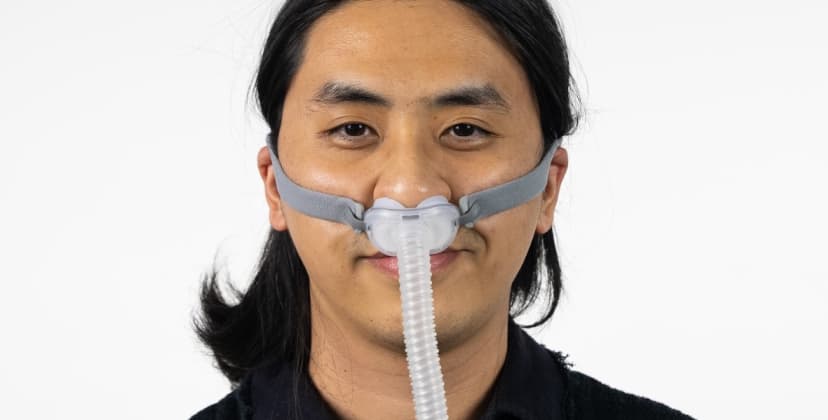
Credit: Sleep Foundation Test Lab
Price
$99
Full Details
With so many CPAP masks on the market, finding one that meets all of your needs can be a challenge. The ResMed AirFit P10 checks a lot of boxes, and the different pillow size options makes it a good fit for a wide range of sleepers.
What Does It Do?
This nasal pillow mask is exceptionally light, weighing less than 2 ounces, and the flexible elastic straps conform to your facial profile without feeling tight or constrictive. A single side clip allows you to adjust the straps for a comfortable fit. For added customization, the mask comes with nasal pillows in small, medium, and large sizes. You can also order an extra small pillow if none of the other three sizes are a good match. Additionally, the “for her” pack includes extra small, small, and medium size cushions.
Who It’s Best for
This wide selection of sizes ensures most wearers will find a comfortable option, so this is a good option for users who have trouble finding a well-fitting mask. The AirFit P10 is also very quiet thanks to built-in mesh vents, never rising above 13 dBA, so you shouldn’t experience any noise-related sleep disruptions due to your mask being too loud. This is helpful if you have a sleep partner who wakes easily from noise during the night.
The ResMed AirFit P10 is relatively affordable compared to other nasal CPAP masks, and those who order from The Sleep Doctor receive a 5% discount by signing up for a subscription. Low-cost flat rate shipping is available to customers in the contiguous U.S. Unused masks may be returned within 30 days of delivery.
Best for Higher Pressure Settings
ResMed AirFit N20 Nasal CPAP Mask
Use this link for the most current ResMed discount
Use this link for the most current ResMed discount
From the low profile to a quick release design, the ResMed AirFit N20 Nasal CPAP Mask is the ultimate user-friendly mask. Secure seals make the mask a solid choice for people who require high pressure levels during their therapy.
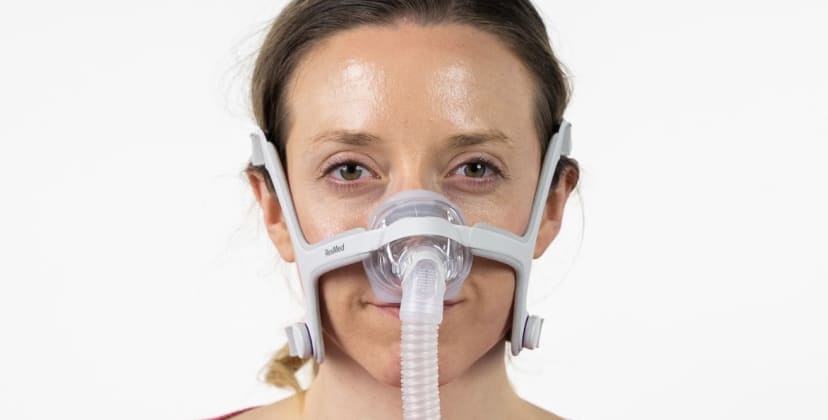
Credit: Sleep Foundation Test Lab
Price
$119
Full Details
The ResMed AirFit N20 Nasal CPAP Mask has an innovative design that provides users with a secure seal and personalized comfort. The low profile enables good visibility and helps you avoid indentations on the forehead.
What Does It Do?
The mask features magnetic clips for immediate and precise adjustments. The headgear is padded to reduce pinching and next-day red marks. The mask is available in small, medium, or large sizes and comes with the mask, cushion, and headgear. Additional headgear, tubing, and pillows are available for purchase with your initial kit. It is designed to be compatible with any CPAP machine.
Who It’s Best for
The AirFit N20 has a front-of-face tube connection that many sleepers find more comfortable than top-of-head placement. The mask provides a clear field of vision that allows users to wear the mask while reading or watching TV. The mask also features a quick-release elbow to make it easier to put on and remove, so we recommend this model for users who find other masks difficult to take on and off.
The AirFit N20 is backed by a 90-day warranty that covers manufacturing defects.
Disclaimer: In November 2023, ResMed issued a safety notice cautioning that the magnetic clips on this model and other ResMed masks should be kept at least 6 inches away from any implanted medical device that may be affected by magnets, including pacemakers and insulin pumps. The company also warns that other metallic implants such as valves, stents, and certain dental implants may be impacted by the magnetic clips.
Best Value
Rio II Nasal Pillow CPAP Mask
Use this link for the most current React Health discount
Use this link for the most current React Health discount
The Rio II has several adjustable features to maximize your comfort, and the attractive price-point helps it stand apart from other masks on the market.
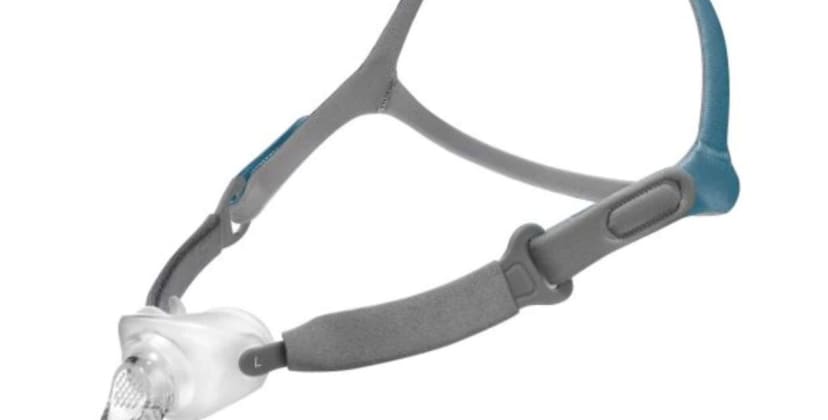
Price
$72
Full Details
While you shouldn’t necessarily skimp on a CPAP mask, there are plenty of affordable options if you’re shopping with a tight budget. The Rio II from React Health — formerly known as 3B Medical — is a high-quality option if you’re in the market for a nasal pillow mask. Its price-point is relatively low, but the mask is highly customizable to help you sleep comfortably.
What Does It Do?
One notable feature is the adjustable pillow angle. By changing how the pillows are positioned, you can avoid irritation and redness around your nostrils. Your mask comes with small, medium, and large pillows. The straps can also be adjusted to your liking with hook-and-loop closures. The elbow has a ball-and-socket design, allowing full range of motion when you need to move or tilt your head.
Who It’s Best for
Thanks to the approachable price-point, the Rio II is a good choice for shoppers looking for a mask that’s budget-friendly but still gets the job done. We also recommend this mask for users who find competing masks too uncomfortable. The adjustable angle on the pillow helps optimize the overall comfort level of the mask.
In addition to its below-average price-point, the Rio II includes affordable flat-rate shipping for customers in the contiguous U.S. The mask may be returned unused within 30 days of delivery.
Best Overall
ResMed AirFit N30 Nasal CPAP Mask
Use this link for the most current ResMed discount
Shop at Sleep DoctorA thin profile and lightweight design elevate the comfort and flexibility of this nasal CPAP mask.
See More Details

Best for Side Sleepers
Philips Respironics DreamWear Nasal CPAP Mask
Use this link for the most current Philips Respironics discount
Shop at Sleep DoctorTubing at the top of the head allows you to comfortably wear this nasal CPAP mask while sleeping on your side.
See More Details

Credit: Sleep Foundation Test Lab
Best for Light Sleepers
ResMed AirFit P10 Nasal Pillow CPAP Mask
Use this link for the most current ResMed discount
Shop at Sleep DoctorA flexible and lightweight nasal CPAP mask designed to reduce noise during delivery and prevent sleep disturbances.
See More Details

Credit: Sleep Foundation Test Lab
Best for High Pressure Settings
ResMed AirFit N20 Nasal CPAP Mask
Use this link for the most current ResMed discount
Shop at Sleep DoctorSturdy yet flexible headgear holds this nasal mask in place, allowing you to receive CPAP therapy at any air pressure level.
See More Details

Credit: Sleep Foundation Test Lab
Best Value
Rio II Nasal Pillow CPAP Mask
Use this link for the most current React Health discount
Shop at Sleep DoctorA lightweight, comfortable nasal CPAP mask that doesn’t skimp on quality despite the approachable sticker price.
See More Details

Who Should Use a Nasal CPAP Mask?
Experts consider nasal masks to be the best type of CPAP mask for most people. Nasal masks tend to be more effective at reducing lapses in breathing, and they may feel less oppressive, as they often have fewer straps than a full-face mask.
You may benefit from using a nasal CPAP mask if you:
- Breathe through your nose: Nasal masks only deliver air through the nose, making them ineffective for people who breathe primarily through their mouth.
- Are a restless sleeper: Most nasal masks have a small frame and just one or two straps, so they’re compatible with different sleep positions and are less likely to disrupt the seal when you move.
- Have facial hair: Since they don’t cover much of the face, nasal masks are less likely to chafe against facial hair. Nasal pillow masks are a particularly good choice for people with facial hair, as they seal inside the nose.
High-pressure airflow can be uncomfortable when delivered through nasal pillows due to the more direct stream of air. If you use CPAP therapy above 12 centimeters of water pressure (cm H2O), you may prefer a traditional nasal mask or a full-face mask. A full-face CPAP mask is less likely to cause air leaks if you breathe through your mouth while sleeping, whether due to nasal congestion or other factors.
Nasal vs. Nasal Pillow CPAP Masks
Nasal and nasal pillow masks seem to be equally effective at providing CPAP therapy for obstructive sleep apnea. A nasal mask interface rests over the opening of the nostrils, whereas nasal pillow masks contain small inserts that seal inside the nostrils themselves.
Some sleepers find that nasal pillow masks stay in place better and are more compatible with facial hair. On the other hand, nasal pillow masks may be less comfortable at higher pressure settings.
What to Consider in a Nasal CPAP Mask
When choosing a CPAP mask, you’ll need to consider practical matters such as compatibility with your CPAP machine, as well as personal factors such as your preferred sleeping position, the shape of your face, and the recommendations of your health care team based on your diagnosis.
Doctor Recommendations
Your health care team should be your main point of guidance when choosing a CPAP mask. They understand what you need from CPAP therapy and can recommend masks that match your profile.
Sleeping Position
Traditional nasal CPAP masks lend themselves well to back and side sleeping. Since they take up less space on the face, they are less likely to catch on bedding compared with a full-face mask. Stomach sleepers typically fare better with the minimalist footprint of a nasal pillow mask.
Fit and Size
A mask that leaks or causes pressure sores can cause CPAP therapy to be less effective or lead to you not wanting to wear the mask at all. Nasal masks are usually sold with several different cushion sizes. Some manufacturers provide printable mask fit guides online to help you select the best fit. You may need to try several different models before finding one that works for the shape of your face.
Compatibility
CPAP masks are generally designed to be compatible with all CPAP machines and hoses that use a standard 22-millimeter cuff connector, but some models may only work with items from the same product line. Before making your purchase, check the user guide for compatibility with your CPAP machine and tubing. You may be able to purchase a hose adapter if you use tubing with a different diameter.
Tubing and Components
Most masks include the mask frame, a cushion or nasal pillows, headgear, and an attachment to connect to CPAP tubing. In the case of nasal masks, tubing typically attaches in the front of the face, although some models have top-of-head hose attachments designed for active sleepers. The tubing itself is sold separately, as are the CPAP machine and related accessories such as filters.
Recalls and Warranties
To protect shoppers against construction flaws, most CPAP masks come with a warranty. Three months is a typical warranty length. You can check the warranty information on the manufacturer’s website.
Since CPAP masks are medical equipment, manufacturers will issue an official product recall if they detect any problems with the mask. In the event of a recall, talk to your doctor to see if the issues apply to you. You may need to return the mask and request a replacement, which the manufacturer will usually provide.
Where Can You Buy a Nasal CPAP Mask?
Nasal masks are sold online and in brick-and-mortar stores. You may also be able to obtain a mask through your doctor or sleep clinic.
How Much Does a Nasal CPAP Mask Cost?
Nasal masks typically run between $50 and $175, while nasal pillow masks can set you back between $70 and $120. Bear in mind that mask components need to be replaced on a regular basis, which adds to the overall cost. Because mask fit is so important to the success of CPAP treatment, we recommend not letting price be the driving factor, if possible.
Prescriptions and Insurance Coverage
While replacement parts can be purchased without a prescription, you do need a prescription to buy a complete CPAP mask, which is considered a Class II medical device. Most online retailers have a system for uploading your prescription if it’s not already on file.
Many insurance providers, including Medicare and Medicaid, subsidize a portion of the cost of CPAP equipment, though you may need to agree to a rent-to-own arrangement. To remain eligible for coverage, your insurer may ask to see your CPAP usage data so they can confirm you are using your CPAP system on a regular basis.
Dive Deeper: In-Depth CPAP Mask Guides
If you and your health care team have decided that a nasal CPAP mask is not for you, check out our recommendations for different types of CPAP masks that may be a better fit for your needs.
Best CPAP Masks by Type
Frequently Asked Questions
Should you use a nasal or nasal pillow CPAP mask?
Whether or not to use a nasal or a nasal pillow mask is a personal choice, as both mask types are capable of delivering effective CPAP therapy. Nasal masks are more common, and they suit a variety of people thanks to their basic, minimalist design. On the other hand, nasal pillow masks have less facial contact and may be more suitable for people with facial hair. The nasal pillows may also be more likely to stay in place when switching sleeping positions. Speak with your doctor about which mask type is right for you.
Can you breathe through your mouth with a nasal CPAP mask?
Breathing through your mouth is possible while wearing a nasal CPAP mask, but it might allow air to escape and diminish the effectiveness of CPAP therapy. If you frequently breathe through your mouth while sleeping, your doctor may recommend using a CPAP chin strap to keep your mouth closed, or they may suggest trying a full-face CPAP mask instead.
Can you buy a nasal CPAP mask online?
Many online retailers sell nasal CPAP masks. Shopping for a nasal CPAP mask online offers a wider selection and makes it easier to compare prices, although many websites do not accept insurance. When buying online, always make sure to purchase from a vendor you trust. If you are buying a complete nasal mask, the vendor should ask for a copy of your prescription.
How do you clean a nasal CPAP mask?
To keep your nasal mask clean and functioning well, experts recommend a daily wipedown of the cushion or pillows and a weekly deep clean of all the mask components. Take apart the mask and wash the headgear, tubing attachment, frame, and cushions separately with warm water and mild soap. You should also wash your CPAP tubing weekly using the same method. Make sure everything is fully rinsed and dried before putting the mask back together.

Still have questions? Ask our community!
Join our Sleep Care Community — a trusted hub of product specialists, sleep health professionals, and people just like you. Whether you’re searching for the perfect mattress or need expert sleep advice, we’ve got you covered. Get personalized guidance from the experts who know sleep best.


